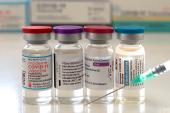Heart Risks Higher With Moderna vs Pfizer/BioNTech Shot, Direct Comparison Shows
However, like prior reports, the Canadian data reassure that myocarditis and pericarditis are rare with the mRNA vaccines.

Myocarditis and pericarditis within 21 days after a second COVID-19 vaccination, though extremely rare, are more common among adults who receive Moderna’s mRNA-1273 shot than it is among those who receive Pfizer/BioNTech’s BNT162b2, according to the first population-based cohort study to offer a direct comparison of the two brands.
The analysis of data from the British Columbia COVID-19 Cohort (BCC19C) was published recently in the Journal of the American College of Cardiology.
Senior author Naveed Z. Janjua, MBBS, DrPH (British Columbia Centre for Disease Control, University of British Columbia, and St. Paul’s Hospital, Vancouver, Canada), said that prior studies on this topic compared vaccination risks against background/expected rates or relied on indirect comparisons between the two products. With a direct comparison, their study allows for understanding of incremental risk, providing robust data that might inform choices between the vaccines, he told TCTMD. “In addition, we also aimed to identify subgroups who could benefit from a different product to reduce their risk.”
What they found, Janjua said, was consistent with prior work.
Guy Witberg, MD, MPH, and Ilan Richter, MD, MPH (both from Rabin Medical Center, Petah-Tikva, Israel), in an accompanying editorial, call the new report “an important step toward this personalized and tailored approach to vaccination.”
Importantly, by using a cohort-study design, the analysis “serves to both account for adherence to vaccination campaigns and reflect an idealized ‘optimum’ outcome of this population-based intervention,” they write.
Three Million Adults
Led by first author Zaeema Naveed, MBBS, PhD (British Columbia Centre for Disease Control and University of British Columbia), Janjua and colleagues analyzed data from the BCC19C for 3,095,414 adults who received two doses of an mRNA vaccine. Three-quarters had Pfizer/BioNTech as their second shot, while one-quarter had Moderna. Median age was similar for both groups (50 and 51 years), as were the median gap between the second dose and the one prior (64 and 62 days) and the prevalence of comorbidities. Women made up a slightly greater proportion of those who received Pfizer/BioNTech compared with Moderna (53.2% vs 49.5%).
In these patients who received a second shot, myocarditis and pericarditis were seen during hospitalization or an emergency department visit more than twice as often within 21 days of Moderna’s mRNA-1273 vaccine as compared with Pfizer/BioNTech’s BNT162b2.
Rates per Million Second Doses
|
|
Moderna mRNA-1273 |
Pfizer/BioNTech BNT162b2 |
Adjusted OR (95% CI) |
|
Myocarditis |
35.6 |
12.6 |
2.78 (1.67-4.62) |
|
Pericarditis |
22.9 |
9.4 |
2.42 (1.31-4.46) |
Receipt of a second Moderna shot, compared with Pfizer/BioNTech, was linked to a significantly greater risk of myocarditis in men (adjusted OR 3.21; 95% CI 1.77-5.83) but not in women, and in individuals younger than 40 (adjusted OR 5.09; 95% CI 2.68-9.66) but not in those older. For pericarditis, Moderna carried greater risk for both men (adjusted OR 2.12; 95% CI 1.01-4.46) and women (adjusted OR 3.21; 95% CI 1.07-9.54) and for both younger (adjusted OR 2.21; 95% CI 1.02-4.78) and older adults (adjusted OR 2.83; 95% CI 1.02-7.79).
“Our findings may have policy implications regarding the choice of vaccine offered,” the investigators conclude. In Canada, for instance, the National Advisory Committee on Immunization has recommended preferential use of the Pfizer/BioNTech vaccine over the Moderna when starting or continuing the primary mRNA vaccine series, Janjua noted. “These data now provide robust evidence in confirmation of these recommendations.”
The editorial explores further how the new findings might be applied.
“For a substantial segment of the population with cardiovascular disease, especially those with left ventricular dysfunction, in whom minimizing risk of myocardial insult is crucial, these data give a strong argument to preferentially use the BNT162b2 vaccine over mRNA-1273,” Witberg and Richter say. “Conversely, in the general population, particularly in those > 40 years of age and in the female population as a whole, the results support the equipoise between the two vaccines in terms of cardiovascular risks, allowing for health authorities to choose vaccine products according to factors such as cost and availability, which should improve resource utilization.”
The study also provides insights into options for patients who developed vaccine-associated myocarditis and as a result couldn’t complete their two-dose course or receive boosters, they point out. Such individuals might consider non-mRNA vaccines, the editorialists suggest. “Another option that now comes to mind, considering the results by Naveed et al, is for individuals who developed myocarditis following the mRNA-1273 vaccine to receive the BNT162b2 under close monitoring, perhaps first in the settings of a dedicated study that will examine the safety and efficacy of such a strategy.”
For physicians, Janjua said, it’s important to remember that risks of myocarditis and other severe complications are much higher following COVID-19 infection than after mRNA-based vaccination.
“Vaccines are effective in reducing severe disease and complications,” he stressed, adding, “Most cases of myocarditis following vaccination are mild and self-resolving. In addition, emerging data suggest that the risk of myocarditis following boosters is very low, much lower than [with the] second dose,” with no difference in risk between the Pfizer/BioNTech and Moderna vaccines.
Going forward, “we need to monitor and assess intermediate-to-long-term outcomes among children who developed myocarditis compared to those who did not. In addition, there is need for more-robust data for booster doses,” Janjua suggested.
Caitlin E. Cox is Executive Editor of TCTMD and Associate Director, Editorial Content at the Cardiovascular Research Foundation. She produces the…
Read Full BioSources
Naveed Z, Li J, Wilton J, et al. Comparative risk of myocarditis/pericarditis following second doses of BNT162b2 and mRNA-1273 coronavirus vaccines. J Am Coll Cardiol. 2022;80:1900-1908.
Witberg G, Richter I. A tale of 2 mRNA vaccines: the spring of hope, the winter of despair. J Am Coll Cardiol. 2022;80:1909-1911.
Disclosures
- This work was supported by the British Columbia Centre for Disease Control and the Canadian Immunization Research Network through a grant from the Public Health Agency of Canada and the Canadian Institutes of Health Research. This project was also supported by funding from the Public Health Agency of Canada through the Vaccine Surveillance Reference Group and the COVID-19 Immunity Task Force.
- Naveed, Witberg, and Richter report no relevant conflicts of interest.
- Janjua reports participating in advisory boards and having spoken for AbbVie, unrelated to the current work.





Comments